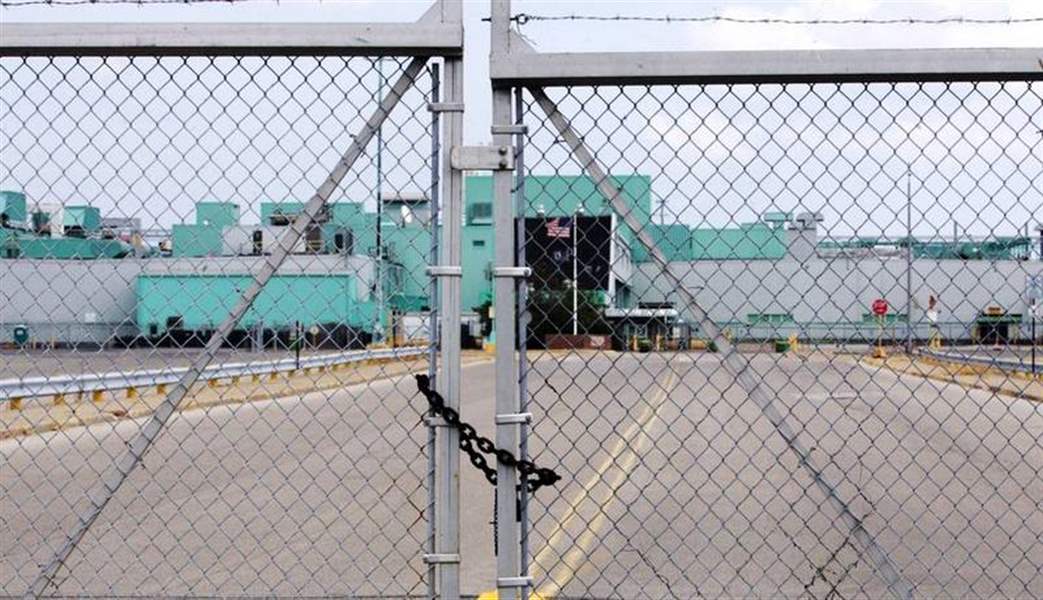
Northwest Ohio, nation feel effect of walkout at GM
9/26/2007
The gate is locked at the entrance to the General Motors Corp.'s Powertrain Plant on Alexis Road in Toledo.
As the strike against General Motors Corp. continues, the rippling effect is being felt across northwest Ohio and the nation.
At Norplas Industries Inc. in Northwood, 300 workers have been laid off because of the GM strike by the United Auto Workers.
Operations at a Woodbridge Corp. plant in Fremont have been slowed, and Toledo's Dana Corp. wouldn't comment on the strike's effect on its factories, but the auto supplier generated 10 percent of its revenues last year from GM.
Other metro Toledo parts makers declined to say whether the strike had affected their work.
But Delphi Corp., the largest U.S. auto-parts maker, slowed production at some plants yesterday and began laying off employees at some plants. Lear Corp., the second-largest automotive seat maker, based in Southfield, Mich., stopped production at some plants.automotive seat maker, based in Southfield, Mich., stopped production at some plants.
Tenneco Inc., the largest maker of automobile exhaust systems, and Sanluis Corp., a supplier of suspension and brake components, said GM told them to stop shipping some components. Tenneco laid off 500 workers at five plants as a result of the strike, a spokesman said.
Meanwhile, picketing continued at GM plants nationwide, including one on Alexis Road in Toledo. Negotiators for the union and company met again yesterday, the day after the UAW ordered the walkout over stalled contract talks.

The gate is locked at the entrance to the General Motors Corp.'s Powertrain Plant on Alexis Road in Toledo.
More than 73,000 UAW-represented factory workers picketed in the first national strike against the top U.S. automaker since 1970.
Union leaders have said job security is its top concern. The company, unnamed labor leaders have said, wants lower wages for new hires, has proposed changes in its retirement program, and wants a separate health-care account to handle its rising medical costs.
The impact from the shutdown of more than 80 GM facilities in the United States hit GM's plants in Canada and Mexico. Two GM plants in Ontario, Canada, shut down because of the strike, with the company reviewing the status of another plant, a GM spokesman for Canada said.
Canadian Auto Workers union President Buzz Hargrove said Monday up to 100,000 Canadian workers could be out of a job if the U.S. strike drags on.
GM's production at three Mexican plants could be hit because of a pledge by the Teamsters' union to stop hauling the company's vehicles across the border into the U.S. market.
With just-in-time delivery by many automotive suppliers, the strike on Monday had almost instant impact. At Norplas on Oregon Road in suburban Toledo, just 200 hourly and salaried workers remain on the job.
The plant molds, paints, and assembles plastic automotive bumpers for GM vehicles, including the Chevrolet Cobalt and some Cadillac models, a spokesman said.
No layoffs have occurred at the Woodbridge factory, but work has slowed in its production of polyurethane foam seats for the Chevrolet Cobalt and Pontiac Solstice, a UAW leader said.
"We are running production, but we shut down the tooling for the GM line and we are running lower production numbers," said Paul Lopez, chairman of Local 959. The local represents about 130 workers at the plant.
GM has two northwest Ohio factories. Its Toledo Powertrain plant has 1,850 hourly employees and its Defiance Powertrain foundry has 1,540 workers.
In Flint, Mich., Jim Brown, a 38-year veteran of GM, was picketing yesterday.
"No one wants to see GM hurt; no one wants to see them go down the tubes," he said. "But we have to keep our standard of living, and GM is going to have to cooperate."
UAW President Ron Gettelfinger told a radio station in Detroit yesterday that the strike may bring a quicker end to the impasse.
The UAW has said the automaker pushed the union into striking by not showing a willingness to meet it halfway on crucial issues such as job security.
Mr. Gettelfinger cautioned that the UAW had no intention of suspending the strike before an agreement was reached. The UAW is paying striking workers $200 a week from its $800 million strike fund.
Many analysts predicted a protracted strike against the largest U.S. automaker was unlikely and the two sides could still settle on a wage-and-benefit deal that delivers many of the sweeping concessions GM has sought.
"The action is designed to allow UAW leaders to look vigilant in fighting to preserve benefits, members to feel concessions are not being given gratuitously, and GM management to appear to be maximizing shareholder value," Goldman Sachs analyst Robert Barry said.
He added that a short strike could help GM trim bloated inventories.
Barclays Capital Research analysts said the strike was unlikely to go beyond two weeks.
GM, Ford Motor Co., and Chrysler LLC are seeking concessions from the UAW to close a labor-cost gap with Toyota Motor Corp. and other automakers operating in the United States. GM lost $2 billion in 2006 and $10.6 billion the year before, and its U.S. market share has been falling.
The outcome of this round of talks is seen as crucial to efforts by the Big Three Detroit-based automakers to recover from combined losses of $15 billion last year and sales difficulties that have driven their share of the U.S. market below 50 percent.
Blade business writer Mark Reiter contributed to this report.